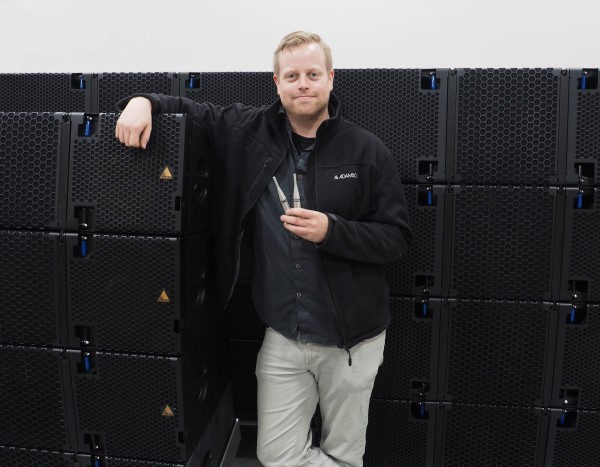Adamson Trusts Earthworks M23 Measurement Microphone
Milford, NH – With such a high level of engineering and precision that goes into the manufacture of Adamson loudspeaker systems, having the right equipment to use in conjunction with their loudspeakers is critical. When it comes to measurement microphones, Adamson relies on the Earthworks M23.
Brian Fraser, Senior Applications Engineer and Product Manager at Adamson, describes the manufacturing process Adamson employs for their loudspeaker systems for touring applications and high-end installations. “Adamson is one of the last manufacturers of high performance pro audio sound equipment that is still made entirely in-house. We are not a sub-assembler; all of our loudspeakers and nearly all of the internal components are manufactured by us in Canada. We use Kevlar as our cone material, which exhibits a high Young’s Modulus (a ratio of stiffness to mass), which translates to an excellent impulse response. In addition, we have several patented technologies that allow our off-axis horizontal response to be much cleaner than many other loudspeaker systems on the market. We design everything from the ground up, and not just loudspeakers. We make our own software and accessories, such as patch panels.”
Adamson is widely recognized as an industry leading manufacturer of the most technologically advanced loudspeaker systems in the world, and as such, requires a measurement microphone that provides accurate results that Adamson’s team could trust. “At Adamson, we wanted to improve our system tuning kits, so we started looking at the M23, as it is significantly shorter than the M30, which made it easier to carry around and use, and less susceptible to potential damage. Right now, our team of audio engineers uses the M23 for many tasks, including system setups while on the road or in training.”
Fraser came across Earthworks measurement microphones early in his career while working with bands. “I would see people coming in to tune the sound system with their Earthworks measurement microphones, typically the M30. The more attention to detail the engineers had, the more likely they were to be using an Earthworks measurement microphone. As I got more involved in the technical side of the audio industry, it became clear what the preferred measurement microphones were.”
Fraser describes his preferred method of deploying an Adamson loudspeaker system using Earthworks M23 mics: “When using multiple measurement microphones to test a big PA, my preferred method is to place one in the near field, one in the far field and then one or two in-between, all on-axis to one of the main hangs. You can then compare the response of the PA at varying distances from the speakers, using a live average, such as what is available in Smaart™ 7 and 8. I typically do not use the correction software for the Earthworks measurement microphones because the variance between microphones is very low, typically between 0.2 or 0.3 of a dB. What I am looking for are overall sonic characteristics of the PA and the interaction with the space I’m in, as an issue seen in one area of the coverage is not always evident in others, and therefore trying to fix that issue may affect the response negatively for the rest of the audience.”
Fraser recounts his most notable event using Earthworks microphones back in July 2015. “My most memorable experience using an Earthworks measurement microphone was when we set up a loudspeaker system for the Pope in Ecuador with C.Vilar, one of our Colombian partners. There were 24 PA towers over a two square mile area with nearly 2 million people in attendance. I was really impressed with the consistency that the M23s provided in the setup for this very large event. When I use more than one measurement mic simultaneously, calibrating the overall measurement system is essential. In the field, I place the mics as physically close together as possible to make sure none of the mics have a different reading, then I match my gain between mics before moving them throughout the space. I was using 4 M23s at the time, mics I had used constantly for the previous year on the road and they were all within 0.2 to 0.3 dB of each other, without a correction file. This was outside in hot, windy conditions.”
“The Earthworks microphones also have a high profile in the industry, which is a benefit to us as a manufacturer. When we represent Adamson in the field, we like to show up with well-respected gear, and the Earthworks mics tick that box, in addition to doing a really good job. The microphones we have don’t break easily and they are reliable and very consistent. These mics also keep their consistency in areas where there is high humidity and high heat. Last year I used the M23s in Egypt and Ecuador in the middle of summer, in addition to using the mics outdoors during the middle of winter in Canada.”
Fraser concludes: “I also have to say, everyone at Earthworks has been great to work with. When I first got our mics, I had a few questions and the response was instantaneous. Since then, I’ve never had to call Earthworks technical support, because nothing has gone wrong with the microphones. They just work!”



